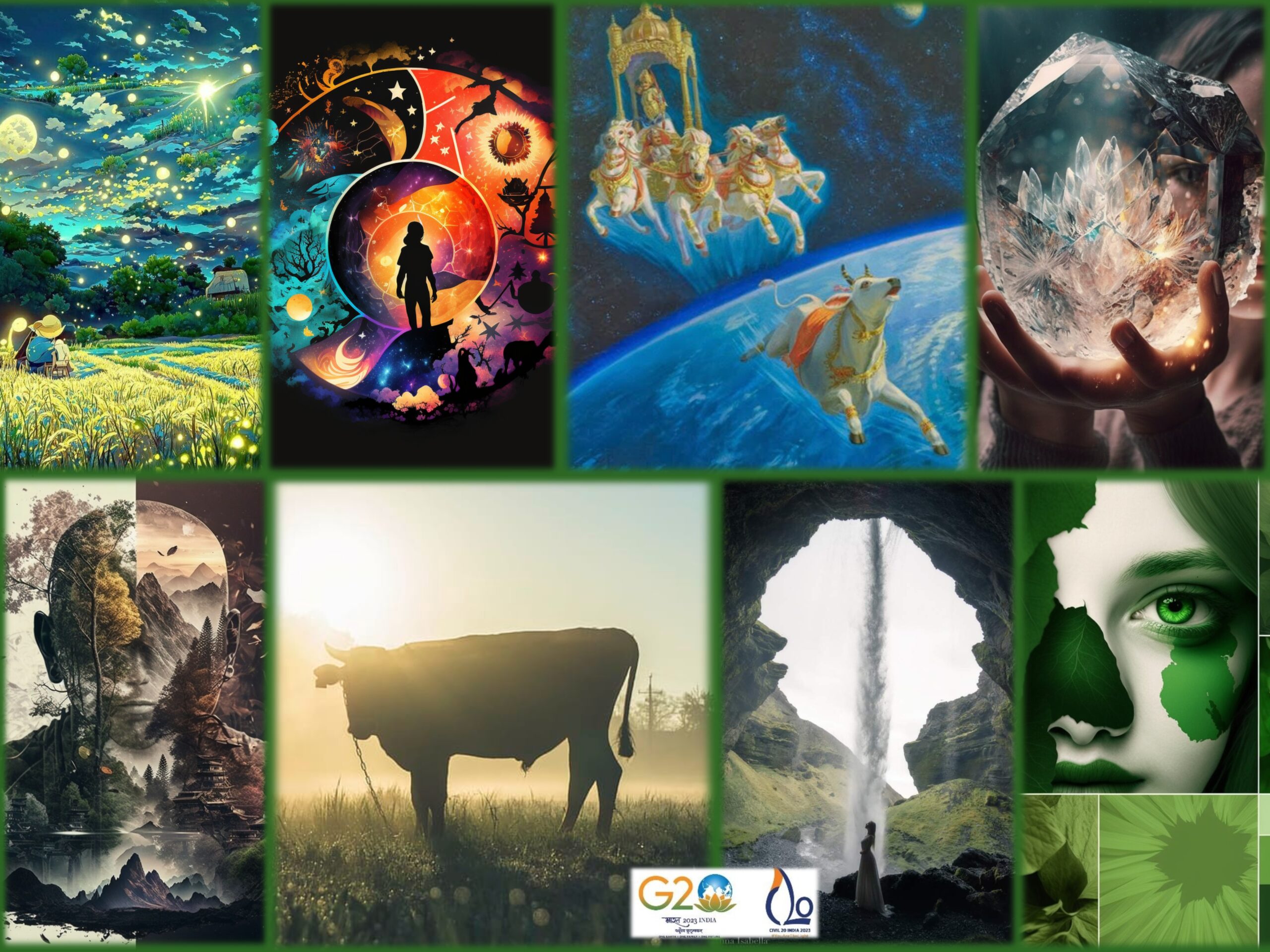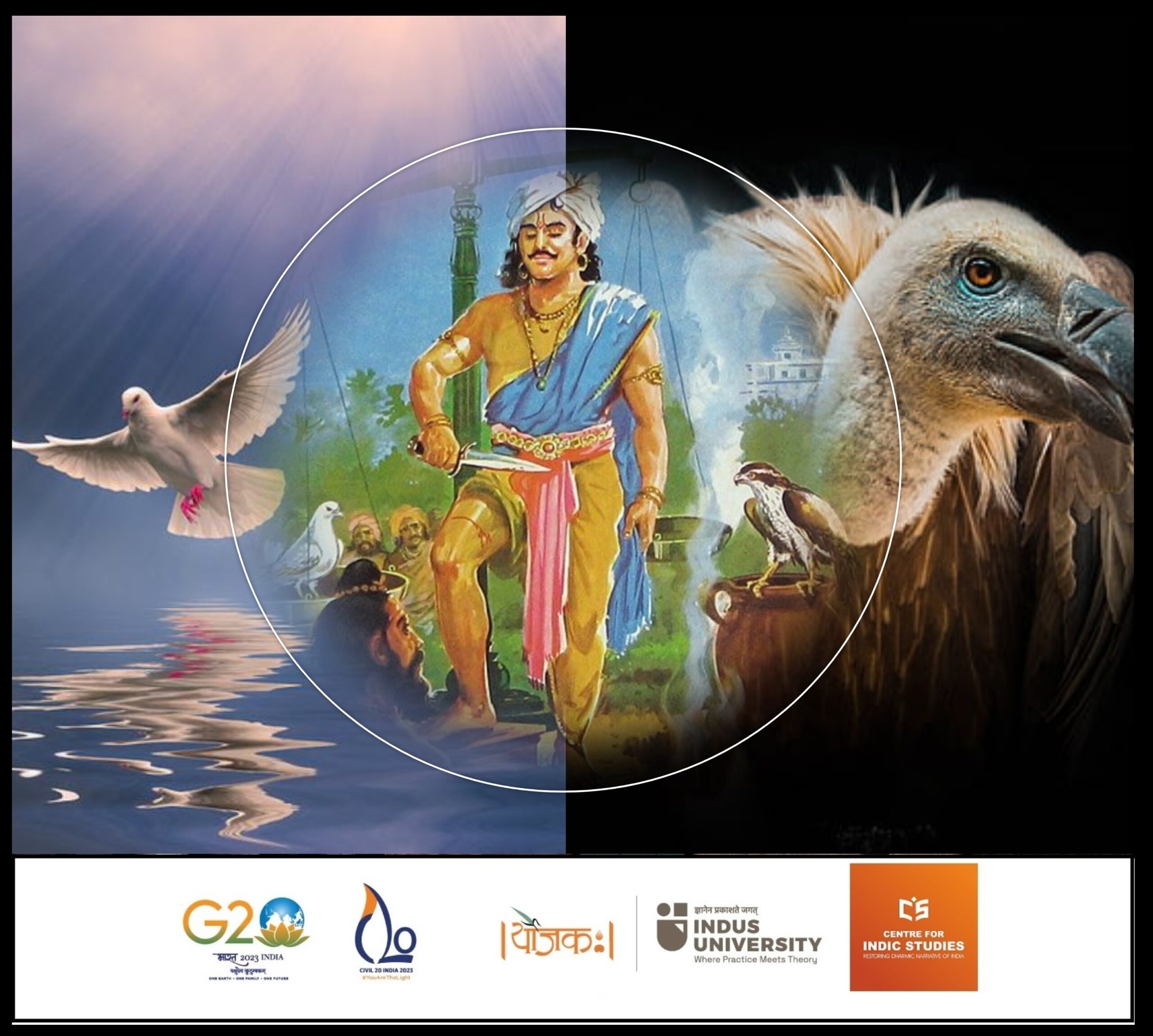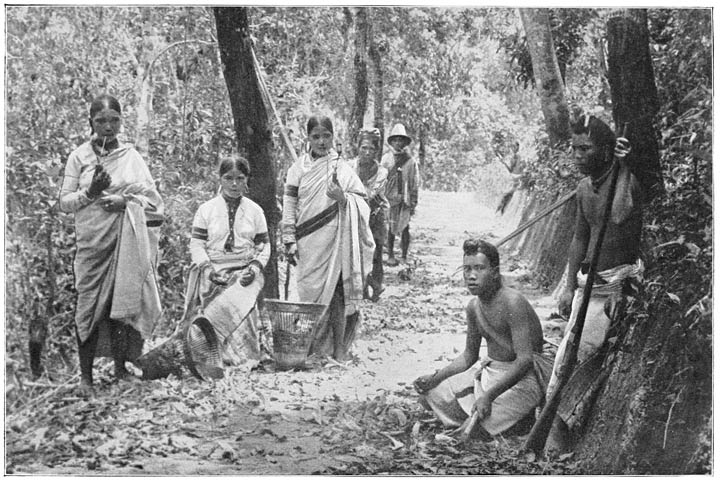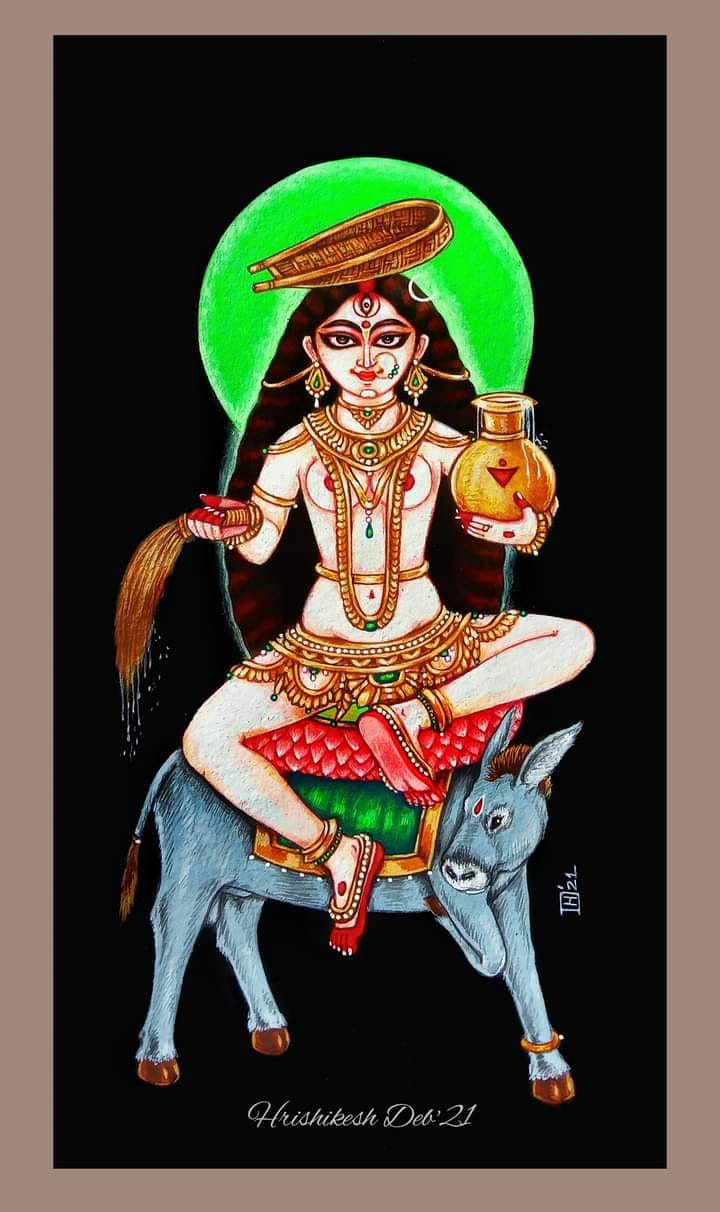- Visitor:41
- Published on:
Tale of Prthu and Mother Earth: Lessons on Sustainable Prosperity (C20_Indic Wisdom Series_Sustainable Lifestyle)
The following piece is taken from Padma Purana that teaches us- it is the Mother Earth that looks after everyone of us and hence it is also our foremost responsibility to take care of Her. This is Dharma. And, the scripture also reminds us that the balance of nature is essential to keep mankind alive and live in harmony with others. This specific part from the grand Padma Purana is chosen to highlight the importance of custom of preserving and conserving natural resources, on which the Hindus have pondered long back.

- The following piece is taken from Padma Purana that teaches us- it is the Mother Earth that looks after everyone of us and hence it is also our foremost responsibility to take care of Her. This is Dharma. And, the scripture also reminds us that the balance of nature is essential to keep mankind alive and live in harmony with others. This specific part from the grand Padna Purana is chosen to highlight the the importance of custom of preserving and conserving natural resource on which the Hindus have pondered upon long back.
Bhisma said:
1. It is heard that the earth was formerly enjoyed by many kings. They are (called) Parthiva on account of their connection with the earth; but on account of (its) connection with whom is the Prthvi (earth) so called?
2. Why is the earth given that technical name ? Tell me why it has the name Gau, or why it is (called) Bhu?
Pulastya said:
3. Formerly Anga by name was the Prajapati of the Krta yuga. He married Mrtyu’s extremely ugly daughter named Sunitha. Her son was Vena.
4-12. This king was attached to wickedness, and was lustful and powerful. He did unrighteous things to people, and took away others’ wives. Though entreated by the great sages for his success and for the (good of the) world, he, of an impure mind, did not grant them safety. The sinless brahmaņas distressed with the fear of anarchy, having killed him, with a curse, forcibly churned his body. From that body, being churned, the Mlecha tribes, dark like collyrium, due to the (presence of) the mother’s portion in the body were created. Due to the contact of the father’s portion, from the right hand of the body a pious son, full of divine lustre, doing righteous things, and with a bow, an arrow, a mace and gems, an armour and armlets, named Prthu, who was Visņu himself, was born. Being consecrated by the brahmanas, and having practised a very difficult penance, he, due to Visnu’s boon, became the lord of all. Seeing the earth without sacred study, without oblation to deities, and void of righteous behaviour, he, of unlimited valour, was, through anger, quite ready to pierce it with his arrow. Then the earth, taking up the form of a cow, was about to flee.
13. Prthu, having a bow and arrows, pursued her. Then remaining in one place, she said: “What should I do?”
14. Prthu also uttered (these) words: “O you of righteous vow, give quickly what is desired by the world-immobile and mobile”.
15. The earth said: “All right”. Then king Pṛthu, making Svayambhuva Manu the calf, milked her (milk in the pot) in his hand.
16. That milk turned into food on which the creatures subsist. Then the earth was milked by the sages, when Soma was the calf.
17-18. Vácaspati (then) milked her (lit. became the milk- man); Veda was the pot, and penance the milk. Then the gods milked her when Marut was the milkman. Indra became the calf and mighty power was the milk. The pot of the gods was golden and that of the Pitrs was silvery.
19-21. The god of death milked her when Yama was the calf and Svadha the milk. The pot of the serpents was a hole and Taksaka was the calf, and poison was the milk. And Dhrtarăştra and the demons too, milked her (taking the milk) in an iron pot, the milk being the trickery harassing the enemies. The calf was Virocana, the son of Prahlada. The milkman then was Trimürdhan, who promoted deceit.
22. O king, the Yaksas desiring to conceal themselves, also milked the earth in ancient days, making Vivasvån, having the gem, the calf.
23. The groups of evil spirits and fiends milked the earth, marrow and clotted blood (being the milk). Raupyanabha was the milkman and Sumâlin the calf.
24. The Gandharvas again, along with the groups of the celestial nymphs milked the earth, making Citraratha (Gandharva) the calf, and the fragrances in the lotus-petal (the milk).
25. Vararuci, the expert in Atharva Veda milked the cow. The mountains also milked her with various jewels (as the milk).
26. Mountain Meru milked (her with) divine herbs (as the milk). The Himalaya was the calf and the pot was made of mountains.
27. The trees also milked the (milk of the) earth, into the pot made from the Palasa tree; the cut-off sprouts were the milk and Sala full of flowers and woods was the milkman.
28. And the fig-tree, the lord of all trees and woods, was the calf. Thus others also milked the earth according to their desire..
29. While Prthu was ruling, there prevailed longevity, wealth, and happiness. There was no poverty, and also no sick person, no poor person and no sinner.
30. When Prthu was ruling, there were no calamities; there was no misfortune; people not having sorrow or grief, were ever joyful.
31. Having uprooted, with the end of his bow, the big mountains, he, with the desire to do good to the people, made the terrestrial globe (i.e. the earth) even.
32-33. There were no inaccessible cities or villages; men did not die with weapons in their hands; there was no sorrow, and science of politics was honoured; men were given to piety when Prthu was ruling. I have narrated to you, in the manner mentioned (above), (which were) the pots, which was the milk (etc.).
34-35. He, the wise one, gave those whatever they liked, when all were giving importance to sacrifice (or, when all were giving i.e. pouring wealth into sacrifice). I have (thus) told you, O highly intelligent one, that since the earth became the daughter of Prthu, she accordingly was known by the wise to be Prthivi.

Suggestions on sustainability by Mother Goddess:
Prthu said:
1-13a. If a very sinful one is killed, O you of sinful conduct, good people rich in merit live happily. Therefore one that is most sinful and of a wicked mind should be killed. Now you have suppressed all seeds by devouring them. Where will you go by being stable after having destroyed the beings? When a sinful one of a bad conduct is killed, the good live happily. Therefore sin should be destroyed; this is the truth; there is no doubt about it. That from which merit proceeds, should be carefully preserved. You have committed a great sin causing the destruction of the beings. He who for himself or for someone else kills one who torments the world, does not incur sin. O auspicious Earth, when many people become happy by a wicked one having been killed, there is neither a (major) sin nor a minor sin. There is no doubt that (i.e. certainly) I shall kill you. If, O Earth, for the good of this world (i.e. these beings), you do not act according to these meritorious and good words of (i.e. uttered by) me, I shall kill you with sharp arrows, if you are averse to my words. There is no doubt that I shall sustain, by means of my lustre and merit, the virtuous beings living in the three worlds. Accepting my meritorious rule, and obeying my order always rejuvenate these beings, O Earth. If, O you good one, you today obey this order of mine, then I shall be pleased with you, and will always protect you, and also other best kings (will protect you); there is no doubt about this.
13b-14a. That Earth, in the form of a cow, with her body adorned (i.c. covered) with arrows, said these (words) to the highly intelligent Prthu, Vena’s son, who was the support of righteousness:
The Earth said:
14b-18. O great king, I shall carry out your order, full of truth and merit, for the well-being of the beings; there is no doubt about it. O best king, enterprises and meritorious undertakings become successful by means of exertion and resourcefulness. O king of kings, find out a means by which you would be upright. Support all the subjects in such a way that you make all of them prosperous. Your stone-like (i.e. hard) and sharp arrows have stuck to my body. O king, you yourself extract them. They very much prick me. Make me (turned into) such (a shape) that the water would remain on me.
Sita said:
19-24. Extracting those big and stone (like arrows) of various forms with the end of his bow, he made the Earth even. Since then, O best brahmanas, those stones grew in size. The son of king Vena, with pleased mind, having extracted his arrows from her body, made even the ditches and the caves with the strokes of his arrows. Thus, he, prospering with merit, made even the entire Earth. Having made her even, and having thought repeatedly, the noble one made Svayambhuva Manu as the first calf. O best ones, during the Manu-periods that had passed, the Earth had become uneven; and there was no path anywhere, O best brahmanas, even and uneven portions were naturally there.
25-32a. When the first period of Cakşuşa Manu arrived, and when the first creation came up, and when the surface of the Earth was uneven, the boundries of villages, cities, towns, countries, and fields that were seized (ksetrapanndnám?) were not noticed. There was no agriculture, no trade and no cow-keeping. No one told lies; there was neither greed nor jealousy. It is said that nobody ever entertained pride or committed sin. O best brahmana, when the Vaivasvata period came, the beings were born even before the birth of Vena’s son. All these beings desired to have an abode. All the beings, through their merit, lived at some places on the ground, or on a mountain, or on the banks of rivers, or in bowers, or at all sacred places, or on the sea-beaches. Fruits, roots and honey was their food. O best brahmanas, (they got) their food with great difficulty.
32b-43. Having seen the misery of the beings, the king Prthu, Vena’s son, made Svåyambhuva Manu the calf. O you highly intelligent one, he used his own hand as the vessel. That Prthu, the tiger (i.e. the best) among men, then milked the Earth, (and) the milk (was) all the crops and all food of a good quality. Those beings satisfied by means of that auspicious food, resembling nectar, all gods and others (like) the manes. Those beings lived happily by the favour of that son of Vena. O best brahmanas, all the virtuous beings, after offering food first to gods, then to brahmanas and especially to guests, enjoyed food. Some offered oblations in sacrifices, and pleased Visnu only, the lord of gods with the same food. The deities also were satisfied (with the food). Rain sent by Vişņu showered. By virtue of that great auspicious trees sprang up. All kinds of crops (grew when) Prthu, Vena’s son, was the king. Due to that food even now all beings live. The sages also, coming together, milked this Earth. It was again milked by the very blessed sages and the truthful gods. Soma was the calf and the lord of gods himself was the milkman. Energy was the milk, resembling water, by which the gods live. All the beings live due to their truthfulness and merit. They follow truth and merit. (Thus) the Earth was milked by the sages.
44-49. Now I shall narrate how formerly the Earth was milked by the manes and who was made the calf. Making a silver pot and svadha, with nectar, the milk, and making Yama the calf, Antaka (i.e. Yama) himself became the milkman. O best brahmanas, then the snakes (Naga) and serpents (Sarpa) milked (the Earth) and (made) Takşaka the calf. Taking a vessel made of gourd (they collected) the milk i.e. the poison (in it). The valorous Dhrtarástra was the milkman for the snakes. O best brahmanas, the matchless serpents and snakes live by that. O best brahmanas, the snakes and the fearful serpents also live by that very poignant poison of a fierce nature, The fierce, huge-bodied and very powerful ones live by that only. They eat it, move with it; that is their power and valour. O best brahmaņas, now I shall narrate to you as to
50-59. how all the demons and the goblins milked the Earth, making, at that time, an iron-pot, and making the milk of the nature of illusion, useful for all purposes, resembling food and destroying all the enemies. The calf of the demons was that powerful Virocana. The priest was Dvimürdhan, and the very mighty Madhu was the milkman. Due to that illusion, the very strong, very wise, huge-bodied and very lustrous and valorous demons thrive. That is their power; that is their manliness; the demons live by that. O best brāhmaṇas, even now they, of limited intellect, live with that illusion. That is their strength. In the same way the Yaksas milked the good Earth, the support of all. O best brahmanas, thus we have heard. Formerly the noble ones (milked the Earth) in the former kalpa (when) the milk was of the nature of obscurity (antardhānamayam?). The very intelligent Vaiśra- vana was made the calf; and the milkman of her (i.e. the Earth) was the meritorious, wisest and best among the intelligent viz. Rajatanabha, father of the Yakṣa Manibhadra. He was omni- scient; he knew all the ways of good conduct; he was the powerful son of the king of Yaksas; he had eight arms, two heads, and had great lustre and had very great (i.e. severe) penance (to his credit). O best brāhmaṇas, the Yakṣas always stood by him.
60-82. This Earth was again milked by the very strong demons; in the same way she (was milked) by the eager goblins who had consumed water. A human skull-a vessel that came up from a dead body-and one made of iron (were the pots used by them). They of strong anger and valor wanted to enjoy (i.e. to have) good progeny. The very strong Rajatanabha was their milkman, the calf was (one) by name Sumälin, and blood was the milk. The demons, evil spirits, and powerful goblins, Yaksas and fearful groups of ghosts live by that (milk). Gandharvas and the celestial nymphs, making the learned Citraratha the calf, milked the Earth again. They milked her (milk) full of the music of Gandharvas. O best brahmanas, the very intelligent and most meritorious Gandharva, Suruci, was their milkman. The noble ones milked pure songs as the good milk at that time. The Gandharvas and others (i.e.) the celestial nymphs also live by that. The auspicious mountains also milked this Earth. They (obtained as milk) various gems and herbs like nectar. The noble Himalaya (mountain) was made the calf. Meru was the milkman, and the pot was made from a big rock. All the very powerful mountains grew (strong) by (drinking) that milk. The great auspicious trees like Kalpa (i.e. the desire-yielding) tree again milked (the Earth). They had brought the pot made of Palafa tree with its sprouts cut off and burnt. At that time Sala, of a flowery body milked (the Earth) and Plaksa was the calf. This (Earth) the supporter of all and the giver of everything was also milked by Guhyakas, Caranas, Siddhas and groups of the Vidyadharas. Whatever the worlds desired with (i.e. by employing) particular vessels and calves, all that she just gave to them, (and) like this (she also gave) them milk with a good mind. This Earth is the supporter, the creator; she is the greatest. She is a cow yielding all desires and is adorned with the auspicious ones. She is the eldest, she is the prop. She is the creation and the beings. She is purifying, she gives merit, she is virtuous, she causes all the crops to grow, she is the supporter and the origin of the entire mobile and the immobile. This (Earth) is great fortune, is learning, and is always full of everything. She yields (i.e. satisfies) all desires; she is a cow yielding milk; she causes all seeds to grow. This (Earth), the supporter of all the human race, is the mother (i.e. the origin) of all righteous deeds. She is the light and the form of even the five elements. She was bounded by the ocean and was known as Medini. The entire Earth was submerged with (i.e. in) the marrow (medas) of Madhu and Kaitabha. Therefore she is called Medini by the expounders of the Vedas. Then, O best ones, due to the arrival of Prthu, the wise son of Vena, she became his daughter, and is called Pythivi. O best brahmanas, that king protected this Earth that is the support of villages and houses, and that is crowned with cities and towns, that has crops and mines, that is bulky and full of all crops, O brahmanas. Thus this goddess Earth is full of all people; (her) prowess like this is mentioned in the Puranas.
Bibliography:
Padma Puran (Gita Press, Gorakhpur)
Padma Purana, Shristikhanda, Description of Solar Race, Chapter 8.
Padma Purana, Bhumikhanda, Chapter 29
Center for Indic Studies is now on Telegram. For regular updates on Indic Varta, Indic Talks and Indic Courses at CIS, please subscribe to our telegram channel !
- 20 min read
- 0
- 0










